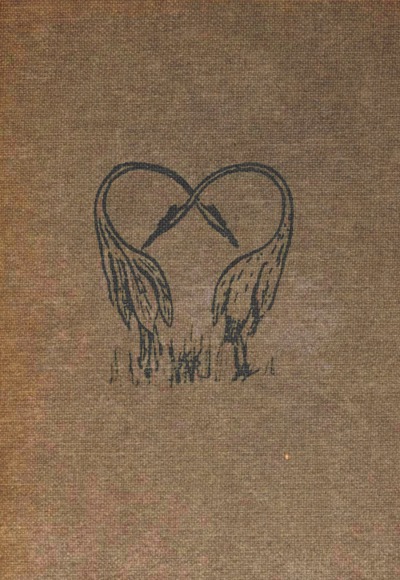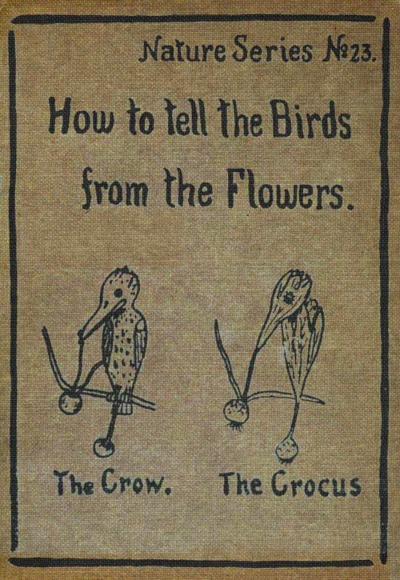
How To Tell The Birds From The Flowers.
A Manual of Flornithology for Beginners.

Verses and Illustrations
By Robert Williams Wood.
Published by Paul Elder and Company
San Francisco and New York.
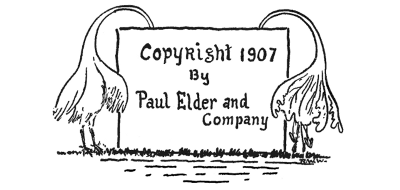
Copyright 1907
By
Paul Elder and Company

|
Who is there who has never heard,
About the Burdock and the Bird?
And yet how very very few,
Discriminate between the two,
While even Mr. Burbank can't
Transform a Bird into a Plant!
|

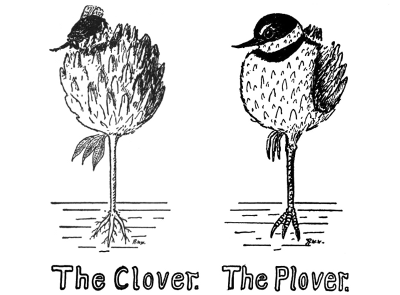
|
The Plover and the Clover can be told apart with ease,
By paying close attention to the habits of the Bees,
For en-to-molo-gists aver, the Bee can be in Clover,
While ety-molo-gists concur, there is no B in Plover.
|
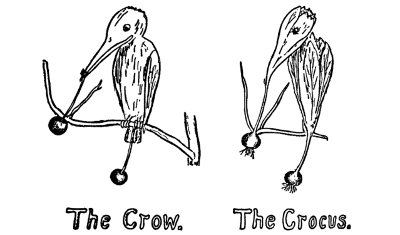
|
Some are unable, as you know,
To tell the Crocus from the Crow;
The reason why is just because
They are not versed in Nature's laws.
The noisy, cawing Crows all come,
Obedient to the Cro'custom,
A large Crow Caw-cus to convoke.
You never hear the Crocus croak!
|
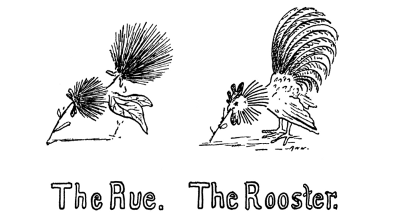
|
Of Rooster the rudiment clearly is "Roo",
And the bird from the plant very probably grew.
You can easily tell them apart without fail,
By merely observing the Rue lacks de-tail.
|
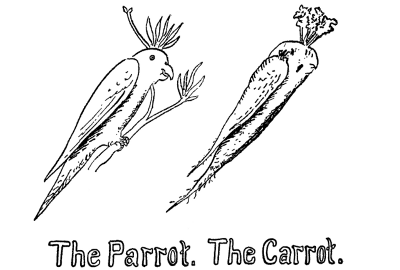
|
The Parrot and the Carrot we may easily confound,
They're very much alike in looks and similar in sound,
We recognize the Parrot by his clear articulation,
For Carrots are unable to engage in conversation.
|
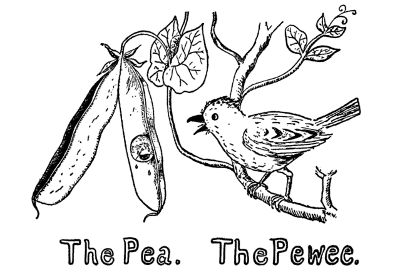
|
To tell the Pewee from the Pea,
Requires great per-spi-ca-city.
Here in the pod we see the Pea,
While perched close by is the Pewee;
The Pea he hears the Pewee peep,
While Pewee sees the wee Pea weep,
There'll be but little time to see,
How Pewee differs from the Pea.
|
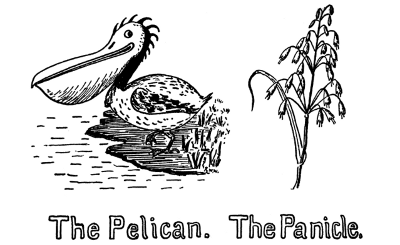
|
The Panicle and Pelican
Have often been confused;
The letters which spell Pelican
In Panicle are used.
You never need confound the two,
There are many ways of telling:
The simplest thing that one can do,
Is to observe the spelling.
|
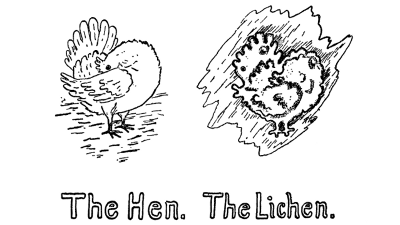
|
The Lichens lie on rocks and bark,
They look somewhat like Hens:
Hens lay, they lie, we may remark,
A difference of tense.
|
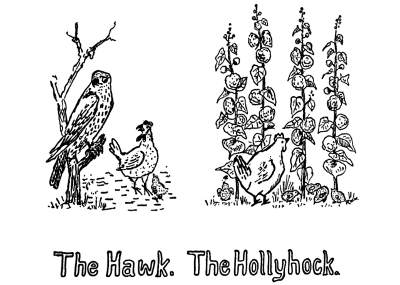
|
To recognize this Bird-of-Prey,
The broody Hen you should survey:
She takes her Chicks on daily walks,
Among the neighboring Hollyhocks,
While with the Hawk association,
Is quite beyond her toleration.
|
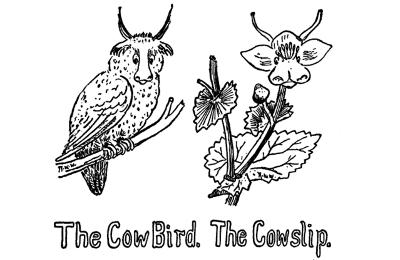
|
Growing in mires, in gold attired,
The Cowslip has been much admired,
Altho' its proper name, we're told,
Is really the Marsh Marigold:
The Cow Bird picture, I suspect,
Is absolutely incorrect,
We make such errors now and then,
A sort of cow slip of the pen.
|
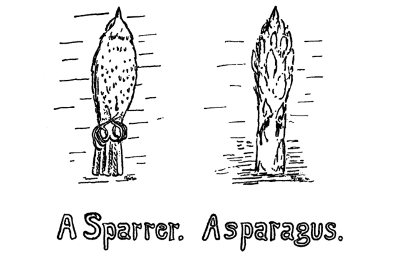
|
The Sparrow, from flying, is quite out of breath,
In fact he has worked himself almost to death,
While the lazy Asparagus,—so it is said,—
Spends all of his time in the 'sparagus bed.
|
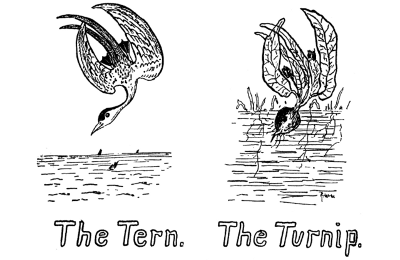
|
To tell the Turnip from the Tern,
A thing which everyone should learn,
Observe the Tern up in the air,
See how he turns,—and now compare
Him with this inert vegetable,
Who thus to turn is quite unable,
For he is rooted to the spot,
|
|
While as we see the Tern is not:
He is not always doomed to be
Thus bound to earth e-tern-ally,
For "Cooked to a turn" may be inferred,
To change the Turnip to the Bird.
|
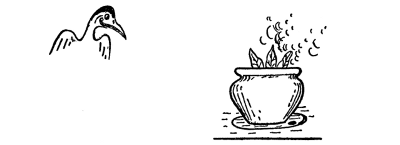
|
Observe the Turnip in the pot.
The Tern is glad that he is not!
|
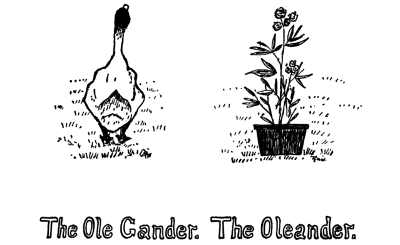
|
The Gander loves to promenade,
Around the farmer's poultry-yard,
While, as we see, the Oleander
Is quite unable to meander.
|
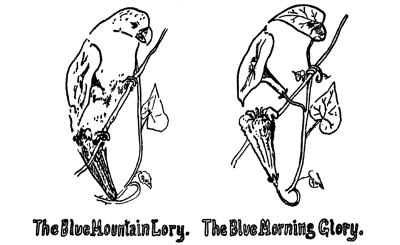
|
The Blue Mountain Lory spends most of his time
In climbing about in a tropical clime;
We therefore our efforts need only confine,
To minutely observing the climb of the Vine.
|
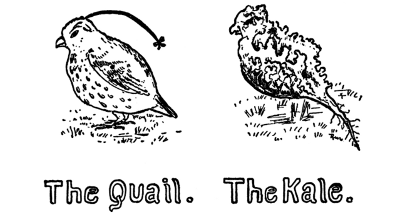
|
The California Quail is said
To have a tail upon his head,
While contrary-wise we style the Kale,
A cabbage head upon a tail.
It is not hard to tell the two,
The Quail commences with a queue.
|
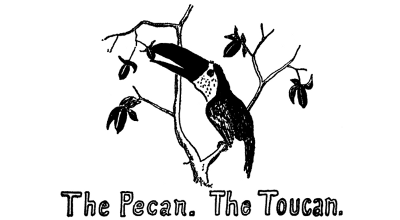
|
Very few can
Tell the Toucan
From the Pecan—
Here's a new plan:
To take the Toucan from the tree,
Requires im-mense a-gil-i-tee,
While any one can pick with ease
The Pecans from the Pecan trees:
It's such an easy thing to do,
That even the Toucan he can too.
|
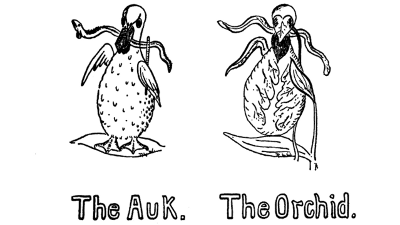
|
We seldom meet, when out to walk,
Either the Orchid or the Auk;
The Auk indeed is only known
To dwellers in the Auktic zone,
While Orchids can be found in legions,
Within the equatorial regions.
The graceful Orchid on its stalk,
Resembles so the auk-ward Auk;
|
|
'T is plain we must some means discover,
To tell the two from one another:
The obvious difference, to be sure,
Is merely one of temperature.
|
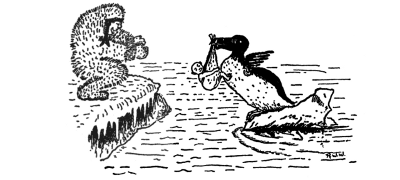
|
For Eskimos, perhaps, the Auk
Performs the duties of the Stork.
|
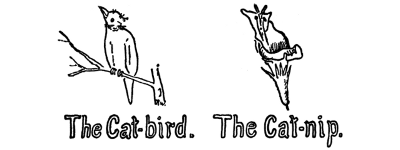
|
The Cat-bird's call resembles that,
Emitted by the Pussy Cat,
While Cat-nip, growing by the wall,
Is never known to caterwaul:
Its odor though attracts the Kits,
And throws them in Catniption fits.
|

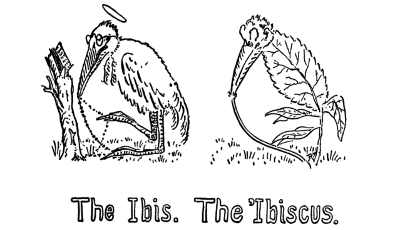
|
The sacred Ibis tells his beads,
And gravely from his prayer-book reads;
The Ibis therfore we may say,
Is classified a bird-of-prey.
'Ibiscus we have heard related,
The "Crimson-Eye" is designated;
Their difference is plain indeed,
The flower is red, the bird can read.
|
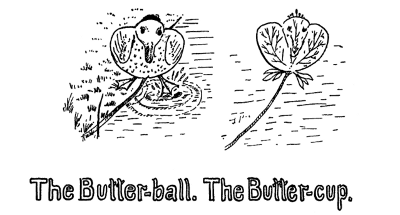
|
The little Butter-cup can sing,
From morn 'till night like anything:
The quacking of the Butter-ball,
Cannot be called a song at all.
We thus the flower may learn to know,
Its song is reproduced below.
|

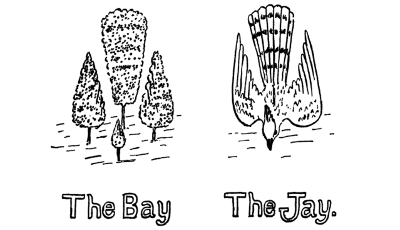
|
The Blue-Jay, as we plainly see,
Resembles much the green Bay tree:
The difference between the two,
Is ob-vi-ous-ly one of hue.
Though this is not the only way,
To tell the Blue-Jay from the Bay.
|
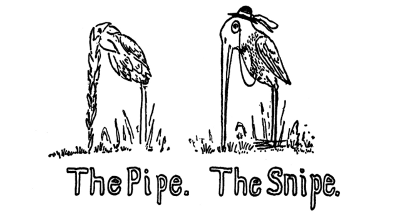
|
Observe the common Indian Pipe,
Likewise the high-bred English Snipe,
Who is distinguished, as we see,
By his superior pedigree.
|

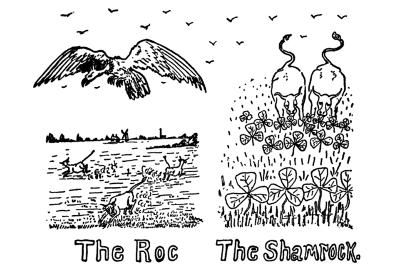
|
Observe how peacefully the Cows
Among the little Shamrocks browse,
In contrast with their actions frantic
When they perceive the Roc gigantic;
We need but watch their ocupation,
And seek no other explanation.
|
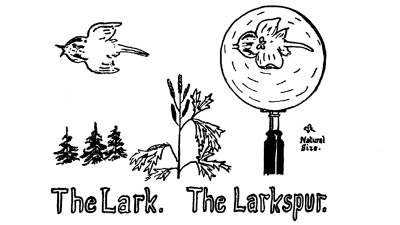
|
The Larkspur's likeness to the Lark
Is surely worthy of remark,
Although to see it we require
The aid of a small magnifier,
Which circumstance of course implies,
Their difference is one of size.
|
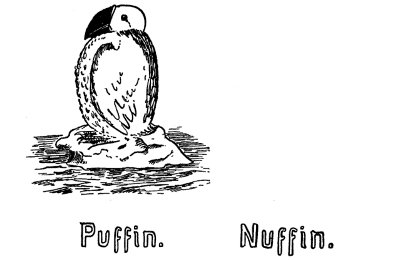
|
Upon this cake of ice is perched,
The paddle-footed Puffin:
To find his double we have searched,
But have discovered—Nuffin!
|
|
Not every one is always able
To recognize a vegetable,
For some are guided by tradition,
While others use their intuition,
And even I make no pretense
Of having more than common sense;
Indeed these strange homologies
Are in most flornithologies,
And I have freely drawn upon
The works of Gray and Audubon,
Avoiding though the frequent blunders
Of those who study Nature's wonders.
|
